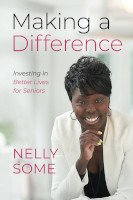
In This Article:
- What are the psychological impacts of seniors leaving their homes?
- How does losing personal agency affect seniors during transitions?
- What challenges do seniors face in adapting to new routines in care facilities?
- How can families better support seniors in maintaining connections and independence?
What To Do with Grandma and Grandpa: 4 Key Truths About Senior Housing Challenges
by Nelly Some.
Since I first developed a new approach to residential care homes, I've had a lot of experience with the challenges families face trying to place their senior loved one in the best situation they can. I've gotten to know a lot of families looking for the right options.
Take John and Ann: they called me out of the blue with a hard decision to make, and I'm sure at least some of you reading this will relate. Ann's mother was unable to live in her own home anymore, but for practical and space reasons, John and Ann couldn't bring her to live with them. Their stress levels were high, the concerns and worries mounting. I could feel it in their voices.
"We just need to know what it would be like for her," John said.
"We just need to know she'll be okay," Anne added.
I appreciate it when people call me in this situation. I love to provide them with the right information so they can better decide where their beloved senior family member should go. Understanding what seniors experience when they move into a facility can have a huge impact on the choices families make. So let's step into a senior's shoes and look at four ways life changes for them:
1. Leaving their own home.
Consider your loved one, who's been living in her own home and managing by herself, maybe for years. She's been facing the fact that she'll need more care and will have to go to a new, unfamiliar place. Talk about traumatic. Anyone who has to leave their own home faces a major psychological transition. Too often they wait until they have no other option. They had a fall or have a health condition, and can't manage any longer on their own.
I've seen looks of great concern in seniors when I worked in larger facilities. Once I had a resident ask me, “Does this mean I am never going back to my home? Will I be dying soon?” He felt hopeless and lost. If they have dementia or Alzheimer's, it's even more confusing. They may feel like they've completely lost control of their lives.
2. Giving up their own agency.
In many cases, it's the senior’s family rather than the senior who makes the decisions surrounding the transition. This can cause further frustration for the older person. Talk about feeling like things are spinning out of control: the senior is no longer calling the shots.
In many cases, the senior was the parent — not only in charge of their life and household, but the people now in charge of their fate. Accepting the role reversals and relinquishing control of one's own life can be a hard adjustment to make.
3. Leaving their own routines.
I've seen firsthand how abrupt changes in routine can be very difficult for seniors (and that's something I build into our own model of residential care). But consider a common scenario: the senior is moved into a large facility, filled with residents and staff. With so many residents to care for, it can be difficult for staff to be sensitive to changes in each individual's level of independence, let alone their needs and wants.
Now imagine something as simple as serving breakfast. At the large facility, the staff serves breakfast every day at a pre-set time, such as 7:00 a.m., placing a tray of fruit and yogurt in front of every resident. Then imagine the senior's point of view. Looking at it, the senior remembers their own former routine: sleeping in until 8:00 a.m., waking up slowly with a coffee loaded with cream and sugar, maybe making themselves some eggs and toast a bit later.
While they are daydreaming about these times gone by, the caregiver enters their room, says, “Breakfast time is over,” and whisks the tray away before the senior even realizes what's happening. It doesn't happen all the time or everywhere, but that's a hard adjustment to make.
4. Giving up connection.
Seniors usually don’t want to rely on others to take care of them. They may be embarrassed, stressed, and confused about what's happening. Losing their sense of privacy and control over the little things in life that made them happy can make them feel down overall — and often, they don't want people to see them like this. Instead of welcoming visitors and family as a welcome break in the day, they may choose to retreat. They may ask people not to come visit.
This is such a common scenario, particularly in assisted living centers and nursing homes. It only serves to deepen a senior's sense of isolation. If your loved one tells you they'd rather you not come visit "for a little while," don't take it personally. It's a sign that they're having trouble adjusting, and they're down about their situation — and it's time to figure out how to improve their daily life in whatever ways you can.
As you're making decisions about where your senior could best thrive, be sensitive to what he or she is going through. These shifts — from leaving the home they've lived in for years, to not being able to wake up when they want or eat what they want, to not wanting people to see them in a condition of dependency, or in a strange, overwhelming facility — can all have an impact on their health and well-being. If you can, talk to them frankly about the various options.
Consider the possibility of a smaller residential care home. You want them treated like the unique, incredibly valuable people they are, not numbers, and feeling as positive as they can about this next chapter. It can make all the difference — not just in their lives, but yours.
Book by this Author: Making a Difference
Making a Difference: Investing in Better Lives for Seniors
by Nelly Some.
 It’s time to make a difference in senior care. Nelly Some’s new and refreshing approach will teach you how you can invest in helping seniors thrive!
It’s time to make a difference in senior care. Nelly Some’s new and refreshing approach will teach you how you can invest in helping seniors thrive!
Senior care in America is changing. When easing into their twilight years, more and more people are looking for alternatives to the traditional care offered by nursing homes and assisted living facilities, where overworked nurses and staff can’t offer personal care and attention to each of their deserving patients. But what other option do seniors have?
In Making a Difference, business leader Nelly Some offers a refreshing answer to the old-fashioned approach to elderly care: residential care homes. Drawing on decades of experience working with seniors, Nelly has developed a unique and successful model for creating and running these facilities, which cater to small groups and individuals and offer an environment that allows seniors to flourish. The care home residents are regarded with respect, given a sense of independence, and placed in a setting where they can enjoy life with caregivers who treat them like family.
For more info and/or to order this book, click here. Book is available in Hardcover, Paperback and Kindle edition.
About the Author:
 Nelly Some is an entrepreneur and business leader who has developed systems and cultures for residential care homes that make them stand out from others on the market. She has spent more than two decades in healthcare, real estate, and construction, and has owned and managed multiple residential care homes. She's the author of Making a Difference: Investing in Better Lives for Seniors. Learn more at www.makingadifferencewithnelly.com.
Nelly Some is an entrepreneur and business leader who has developed systems and cultures for residential care homes that make them stand out from others on the market. She has spent more than two decades in healthcare, real estate, and construction, and has owned and managed multiple residential care homes. She's the author of Making a Difference: Investing in Better Lives for Seniors. Learn more at www.makingadifferencewithnelly.com.
Article Recap:
The article explores senior housing transition challenges, emphasizing the psychological and emotional adjustments seniors face when moving from their own homes to care facilities. It discusses the loss of personal agency, the difficulty of adapting to new routines, and the potential for increased isolation. The narrative highlights the importance of understanding these dynamics to make informed decisions that respect and honor seniors' preferences and dignity.

























